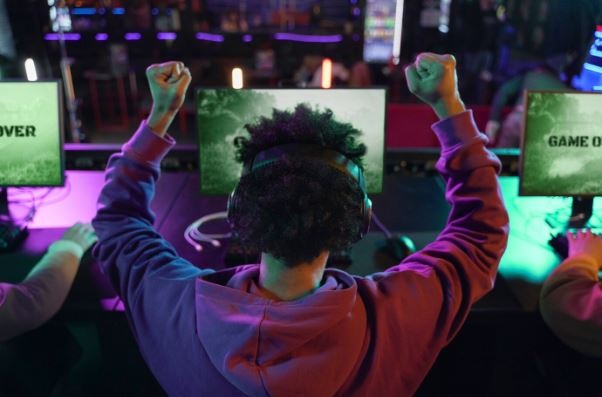E-sports, known as competitive video gaming, have gained immense popularity over the years, attracting millions of fans and players around the world.
This has led to discussions about whether they should be included in the Olympics. Supporters state that e-sports’ increasing global presence and competitiveness make them eligible for recognition by the International Olympic Committee (IOC).
At the same time, critics doubt their compatibility with traditional Olympic values.
Development Process of E-Sports
Initially being small-scale online competitions, electronic sports have now grown into international mega-events where many people watch them while others participate.
For example, tournaments such as The International and the League of Legends World Championships gather millions of viewers who witness how skilled professional gamers can be.
The rapid growth, fostered by improved technology coupled with mainstream acceptance, has seen this niche hobby status turn into a global phenomenon.
All these factors show why it should be given a chance to vie for a place among other disciplines at the Olympics.
Similar to how viewers can engage in esports, Melbet Kenya offers fans a dynamic platform to place bets on various traditional and emerging sports, enhancing their spectator experience.
Arguments for Inclusion
In support of including e-sports within the Olympics, there are several points that may help:
- Appealing to Younger Generations: It is believed that this could attract more youth to watch or engage themselves in various games during such events, which will increase ratings, too.
- Recognition of Skills: The level of strategic thinking needed, as well as training put in by players, equals those demanded from any other sport, hence the need for recognition too.
- Worldwide Popularity: Considering its vast following globally, bringing it on board would be a clear indication that the IOC acknowledges diversity represented through different countries participating in the Summer Games.
- Economic Significance: The e-sports industry generates substantial income thus, injecting funds into the Olympic movement can happen through this channel alone.
These arguments show how electronic sports might improve upon or even change altogether what we know about Olympism today, not only modernising them but also increasing their popularity among wider audiences.
Problems and Censures
The incorporation of e-sports into the Olympics is faced with substantial hurdles. Critics argue that physical activity central to conventional sports is absent in e-sports.
Also, concerns are arising about game violence and commercialism, which characterise the rapidly changing nature of the industry, thus making it difficult for standardisation and long-term planning.
Olympic Values vs E-sports
Matching e-sports against Olympic values presents a complicated matter. The Olympics are all about sportsmanship, fair play, and universal appeal. However skilful or dedicated some players may be, there still arise some doubts as to whether they uphold these principles or not.
For instance, certain games contain violent content, which could contradict peace and unity among nations, as symbolised by this event.
Nevertheless, the principle of non-discrimination calls for the inclusivity of various kinds of sports, hence indicating that with proper regulation and game selection, e-sports could be closer to aligned with Olympic ideals.
Technological and Logistical Aspects
The inclusion of e-sports in the Olympics comes with many technological and logistical challenges. Some of the notable points include:
- Equipment Standardisation: Ensuring every contestant has equal access to similar high-quality gaming setups.
- Fair Play: Putting in place strong measures against cheating so as not to compromise integrity.
- Game Selection: Keeping up with the ever-changing landscape of games while still staying relevant and fair at all times.
These difficulties call for proper prior arrangement between different bodies involved in electronic sports, such as organisations dealing with them, alongside the Olympic Committee. This creates a smooth transition where everyone feels treated equally before, during, and after an event.
Precedents and Current Efforts
A number of efforts have been made to close the gap between e-sports and traditional sports. For instance:
- Inclusion in the Asian Games: In 2018, they were included as a demonstration sport for the Asian Games and will be a medal event at the 2022 Asian Games.
- Olympic Virtual Series: The International Olympic Committee (IOC) launched this series in 2021, which features virtual sports events that aim to engage younger audiences.
- International Recognition: National Olympic committees are starting to recognise e-sports federations more often than before, leading towards deeper integration.
These actions indicate greater acceptance as well as the potential for wider participation of electronic games in larger multi-sport competitions like the Olympics in the future.
Prospects for the Future
Considering current trends, it can be said that there is a bright future awaiting e-sports within the Olympic Games. With continuous growth coupled with the establishment as a legitimate industry, the International Olympic Committee might be bound to accept what appears inevitable.
This includes creating uniform rules and regulations governing all forms of competitive computer gaming and working closely with the IOC towards integration, among other steps forward.
Such a move could help bring the Olympics up-to-date, attracting new generations while diversifying the range of events held during game seasons even further.
Moreover, technological advancements combined with changing attitudes towards video game competitions will most likely provide strong grounds for their admission into this prestigious world event, thus making it an achievable dream sooner rather than later.
The discussion surrounding whether or not e-sports should be included in the Olympics is a watershed moment for both the sporting world and society at large.
This ongoing conversation has the power to reshape traditional values associated with these two entities while simultaneously bringing them into line with contemporary realities characterised by increasing digitisation across various fields, such as entertainment or communication technology sectors.
Furthermore, finding a middle ground between sticking to old ways and embracing new methods will prove essential if we want electronic sports to become part of the Olympic movement successfully.










